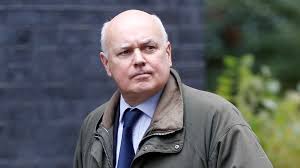Iain Duncan Smith: Career, Controversies, and the Complex Legacy of a Conservative Stalwart
Introduction
In the shifting landscape of British politics, few figures have maintained a presence as consistent—and as polarizing—as Sir Iain Duncan Smith. Known for his stern demeanor, conservative values, and policy-driven mindset, Duncan Smith has been at the heart of the Conservative Party for more than three decades. Whether you know him as a former party leader, the architect behind the controversial welfare reforms, or as one of the key figures behind Brexit, his political footprint is impossible to ignore.
This article explores the man behind the headlines—who is Iain Duncan Smith, his age and background, why he resigned as leader, his family life, net worth, and the curiosity about his heritage and children. Let’s dive into the complex profile of a figure who has been both praised and criticized but never ignored.
Who is Iain Duncan Smith?
Sir George Iain Duncan Smith, often referred to by his initials IDS, is a British Conservative politician and former Leader of the Conservative Party. He has represented Chingford and Woodford Green in Parliament since 1992. Born into a military family, he entered the army himself before making the transition into politics.
He served as Secretary of State for Work and Pensions from 2010 to 2016 during the coalition and Conservative governments under Prime Ministers David Cameron and Theresa May. His legacy, particularly in welfare reform, is controversial, with supporters praising his determination and critics lambasting the human cost of policies such as Universal Credit and disability benefit cuts.
Iain Duncan Smith Age and Birthday
Iain Duncan Smith was born on 9 April 1954, in Edinburgh, Scotland. As of 2025, he is 71 years old. Raised in a disciplined, upper-middle-class family, IDS attended the prestigious Royal Military Academy Sandhurst and served in the Scots Guards between 1975 and 1981.
While his educational background has at times been questioned, particularly claims regarding his studies at the University of Perugia in Italy, he has long maintained that his military experience was formative in shaping his character and worldview.
Was Iain Duncan Smith Prime Minister?
One of the most frequently asked questions about IDS is: Was Iain Duncan Smith ever Prime Minister? The answer is no.
Though he led the Conservative Party from 2001 to 2003, his tenure was marked by internal struggles and a lack of public appeal. He was unable to contest a general election as leader, having been ousted by his own party before he had the chance. That being said, his influence on policy, particularly in social welfare, was arguably greater in ministerial office than it ever was as party leader.
Why Did Iain Duncan Smith Resign as Leader?
Duncan Smith’s leadership came at a challenging time for the Conservative Party. Following their devastating defeat in the 2001 general election, the party was still reeling from the fallout of the Tony Blair landslide. IDS was elected party leader largely due to support from the party’s grassroots, not from MPs.
His leadership was plagued by:
Poor performances in the House of Commons.
Lack of unity within the party.
An inability to connect with the electorate.
In October 2003, he lost a vote of no confidence by Conservative MPs and was forced to resign. He was succeeded by Michael Howard, who had stronger backing within the parliamentary party.
Iain Duncan Smith’s Net Worth
When it comes to personal wealth, Iain Duncan Smith’s net worth is not publicly disclosed, and estimates vary. Unlike some of his Conservative peers, he does not come from immense wealth or hold major corporate interests.
Most of his income is believed to come from his MP salary, previous government positions, and consultancy or speaking engagements. As of 2025, his net worth is thought to be modest compared to other long-standing politicians—likely in the range of £500,000 to £1 million—though no official figure confirms this.
Iain Duncan Smith’s Wife and Family Life
Iain Duncan Smith married Betsy Fremantle, daughter of the late 5th Baron Cottesloe, bringing him into close connection with the British aristocracy. Betsy has largely stayed out of the public spotlight but is known to have supported her husband’s political career extensively over the years.
The couple has four children—three sons and one daughter—though they have been kept largely private, with little public exposure. Some online searches reference an “Iain Duncan Smith son actor,” but there is no verified public record that any of his children are professional actors.
Is Iain Duncan Smith Standing Down?
As of 2025, Iain Duncan Smith is still serving as the Member of Parliament for Chingford and Woodford Green. Although he has been in office for over 30 years, there is no formal announcement of retirement or stepping down from political life. However, given his age and political longevity, many speculate that his departure from front-line politics may be imminent in the next few years.
Iain Duncan Smith’s Japanese Heritage
An intriguing aspect of IDS’s background is his partial Japanese ancestry. His mother, Pamela Summers, was of Japanese descent, with her mother (Iain’s maternal grandmother) being Ellen Oshey Matsumuro, a Japanese woman who married an Englishman.
This gives Iain Duncan Smith a unique place in British political history, as one of the few senior Conservative figures with East Asian ancestry. Although IDS rarely references this heritage publicly, it adds an unexpected dimension to his profile.
Controversial Welfare Policies and Resignation from Cabinet
While he left party leadership in 2003, IDS returned to frontline politics in 2010 as Secretary of State for Work and Pensions under David Cameron. During this time, he spearheaded the introduction of Universal Credit, a reform aimed at simplifying the benefits system.
However, his tenure was marred by:
Widespread criticism over the rollout of Universal Credit.
Accusations of delays, system errors, and hardship caused to vulnerable people.
Disability benefit cuts, which drew condemnation from charities and social workers.
In March 2016, IDS resigned from the Cabinet, stating that the government’s planned cuts to disability benefits were “a compromise too far” and incompatible with his values. The move was widely seen as politically charged and possibly a blow to David Cameron’s leadership.
IDS and Brexit
Iain Duncan Smith was also a prominent Leave campaigner during the 2016 Brexit referendum. As a long-standing Eurosceptic, he was instrumental in shaping the rhetoric of sovereignty and immigration control. His participation in the Leave campaign helped solidify his status among the party’s right-wing and Brexit-backing base.
Legacy: Controversial but Influential
Today, IDS is viewed as one of the most controversial yet influential Conservatives of his generation. His political career has spanned decades, filled with dramatic highs and equally dramatic lows. His legacy includes:
Reforming welfare (for better or worse).
Leading the Conservative Party, albeit briefly.
Being a strong ideological force behind Brexit.
Holding socially conservative views on law, order, and work ethics.
His policies have helped shape the UK’s current welfare and economic climate. Whether admired or criticized, his imprint on British politics is undeniable.
Conclusion
Sir Iain Duncan Smith is a political figure whose career has been as divisive as it has been durable. From his short-lived time as party leader to his impactful (and controversial) welfare reforms, IDS has remained a central figure in Conservative politics for over 30 years.
Whether you’re intrigued by his partial Japanese heritage, his family life, or the question of whether he’ll step down soon, there’s no doubt that his story offers valuable insight into the inner workings of British political power.
For more in-depth profiles on public figures, political commentary, and trending biographies, visit our site: thejangoo.com – where facts meet clarity.







